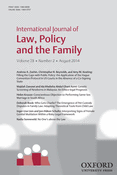-
Views
-
Cite
Cite
Majdah Zawawi, Ida Madieha Abdul Ghani Azmi, Genetic Screening of Newborns in Malaysia: An Ethico-legal Prognosis, International Journal of Law, Policy and the Family, Volume 28, Issue 2, August 2014, Pages 135–149, https://doi.org/10.1093/lawfam/ebu007
Close - Share Icon Share
Abstract
Genetic screening of newborns is not a cure in itself, but it is an important tool for physicians to diagnose a genetic disease or disorder. It also provides hope for parents of children with these rare diseases for treatment or at least some advice as to how to help the children grow in a more comfortable environment. This article argues that any jurisdiction wishing to introduce a specific genetic screening programme which makes it compulsory for parents of newborn children to submit their children for genetic testing must address the issue of informed consent of the parents, the types of tests that would be carried out and the treatment of the genetic information that has been obtained. Malaysia is used as an example of how these factors might be reflected in the law.




